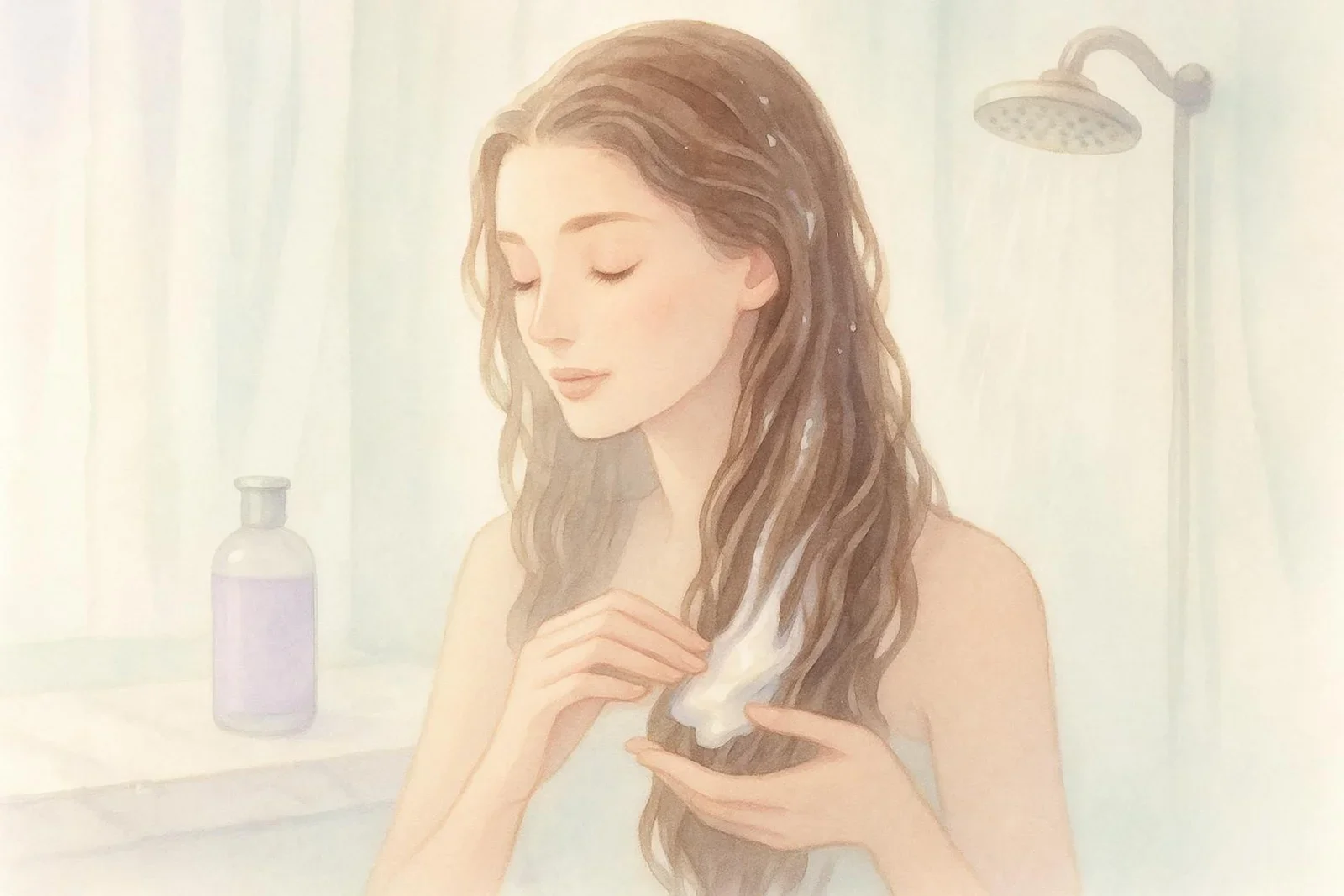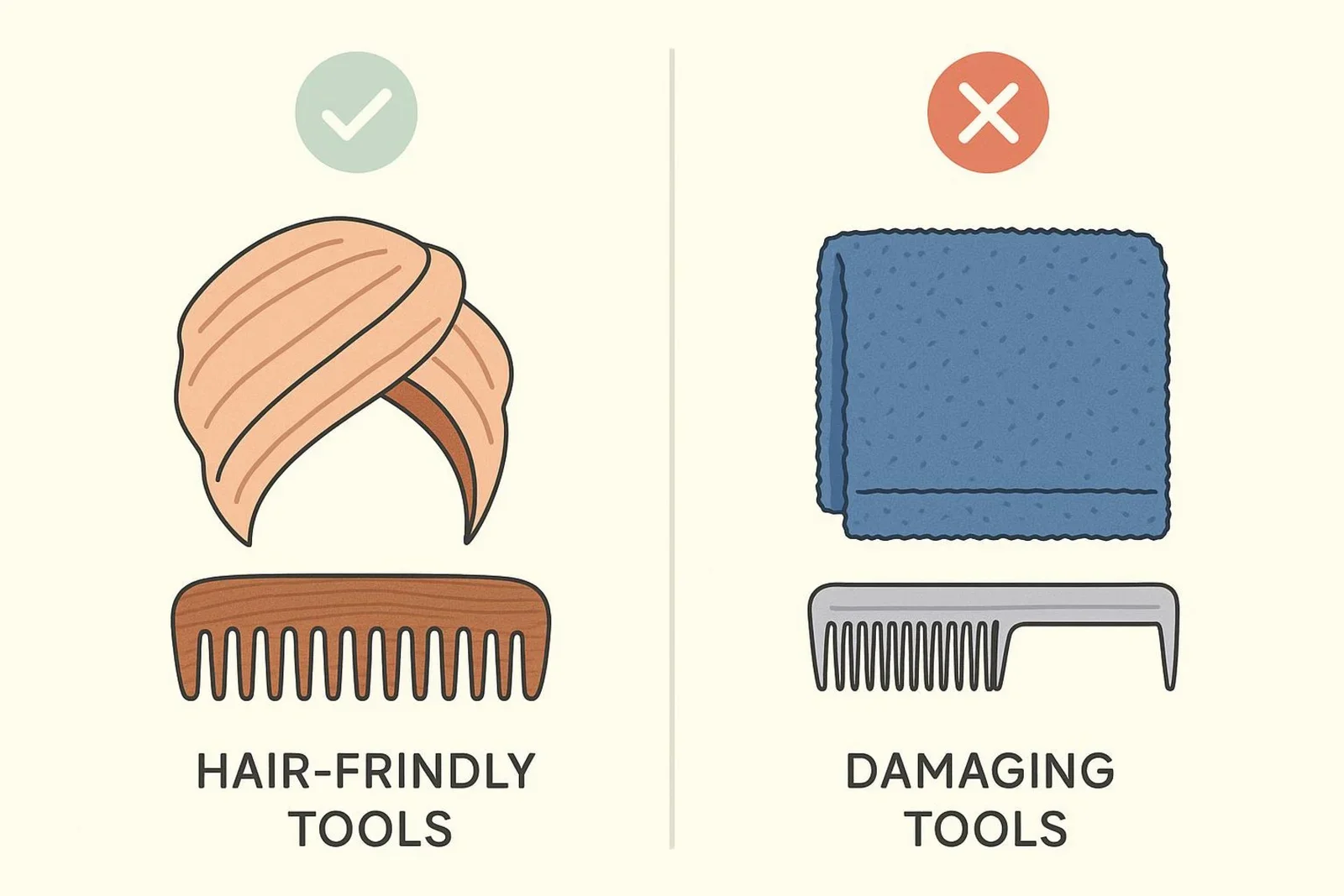Growing Out Your Hair: Tips for a Healthy Journey
Planning to grow your hair longer? It takes time, care, and some changes to your routine. It’s not just about leaving your hair alone; you need to look after it the right way to reach your hair goals. There’s no shortcut for fast growth, but with the right habits and by learning what helps or hurts your hair, you can make the process smoother and keep your hair as healthy as possible during each stage.
What Can Affect Your Hair Growth and Health?
Your hair shows how healthy you are overall. Things like the food you eat and how you care for your hair every day strongly influence how well it grows and how strong it is.
Average Hair Growth Rate
On average, your hair grows about 0.35 mm each day, which is about half an inch per month, or roughly 6 inches (15 cm) each year. Your hair grows at the same rate whether it’s short or long. Short hair can seem to grow more quickly, since changes in length are easier to notice, while longer hair might look like it’s not growing at all, even though it is.
What Factors Affect Growth Rate?
Diet: Not getting enough key nutrients can slow hair growth.
Stress: Being stressed for a long time can cause hair to fall out and affect growth.
Scalp Health: Your scalp is where hair grows from. If it’s not healthy, your hair may not grow well.
Hair Care: Washing, brushing, and styling can help or hurt growth, depending on how it’s done.
Does Age, Genetics, or Hair Type Matter?
Yes, these things matter. Your genes help decide how fast or thick your hair will grow, but bad hair care can hurt even healthy hair. As you get older, your hair might grow slower or get thinner. But your hair’s texture or length doesn’t really affect growth speed-hair grows from the root at about the same pace for everyone. Curly hair might seem like it grows more slowly, but really, it’s just curling up as it gets longer.
The Role of Diet and Lifestyle in Hair Growth
Healthy hair starts with a healthy body. The food you eat and the way you live make a big difference.
Important Nutrients for Healthy Hair
| Nutrient | Role in Hair Growth | Good Sources |
|---|---|---|
| Protein | Main building block for hair | Lean meats, fish, eggs, beans, nuts |
| Iron | Helps carry oxygen to hair | Red meat, spinach, lentils |
| Zinc | Supports hair repair/growth | Oysters, seeds, beans |
| Vitamin C | Helps absorb iron | Bell peppers, oranges, broccoli |
| B Vitamins | Aids cellular health | Whole grains, eggs, leafy greens |
| Omega-3 Fats | Makes hair shiny & strong | Salmon, walnuts, flaxseed |
Are Supplements Useful?
Most people get enough nutrients from food, but sometimes supplements are helpful. Biotin is a common choice, although most people don’t need more. BioSil (ch-OSA) and Nutrafol are often mentioned for supporting stronger, thicker hair. Always talk to a doctor before starting a new supplement to make sure it’s safe for you.
The Impact of Stress on Hair
Stress can seriously affect your hair. When you’re often stressed, your body saves energy for more necessary functions and stops growing hair as fast. This can even cause hair to fall out. It helps to find ways to relax, like exercising, meditating, or doing things you enjoy.
How Sleep Affects Hair
Sleep lets your body recover, including your hair. Not getting enough sleep can mean your hair doesn’t grow well or grows weaker. Aim for enough, good quality sleep to help your hair as well as your general health.
Best Everyday Habits for Growing Out Hair
Your daily routine makes a difference. Small habits done every day can add up to big improvements.
How Often to Wash Hair
Washing too often strips your hair and scalp of natural oils, making it dry, dull, and more likely to break. Most people do well washing every 3-4 days. You might need some time to get used to this if you’re used to daily washes; dry shampoo is a good way to deal with oil in between washes.
Good Shampoo and Conditioner Routine
Pick a gentle, sulfate-free shampoo that works for your hair type.
Use lukewarm or cool water; hot water can weaken your hair.
Condition every time you wash, focusing on the ends and mid-lengths.
Rinse with cold water at the end to help smooth your hair and lock in moisture.
Hair Masks and Deep Treatments
Deep conditioners and hair masks give extra moisture and can make hair stronger, especially if you use heat or color. Use these treatments after washing, letting them sit as long as you can. Focus on the ends if you’re worried about oil, and use regularly for the healthiest long hair.
Scalp Care
Cleanse your scalp to remove product buildup and oil.
Try a scalp massager to help blood flow and stimulate growth.
Use scalp serums or special cleansers for extra care, especially if you have buildup or thinning.
How to Avoid Breakage and Keep Hair Healthy
Keeping your hair from breaking is just as important as making it grow. The more you protect your hair, the longer it can get.
The Effects of Heat Styling
Heat from straighteners, blow dryers, and curling irons can make hair dry, weak, and more likely to split or break. Try to lower how often you use these tools to keep your hair stronger.
The Importance of Heat Protectants
Always use a heat protectant before using any hot tools. These products form a barrier on your hair to help prevent heat damage, and many offer bonus benefits like detangling or adding shine.
Is Air Drying Best?
Letting your hair dry mostly on its own is gentler than using heat. If you do use a blow dryer, wait until your hair is at least half dry. This cuts down on damage, helping your hair to maintain length.
Tools That Prevent Breakage
Use a microfiber towel or an old, soft t-shirt instead of a regular towel for drying hair.
Choose a wide-tooth comb or a special detangling brush, especially when hair is wet.
Start detangling at the ends and work up to the roots.
Spray in some leave-in conditioner before brushing to make it easier.
Better Hair Ties
Go for soft, seamless hair ties or silk scrunchies instead of tight, regular elastics. These are much less likely to snap your hair. When tying your hair up, keep it loose-especially at night.
Trimming and Caring for Hair as it Grows
You need to trim your hair to keep it healthy, even when you want it longer. Keeping the ends healthy stops splits from moving up and causing more breakage.
How Often to Trim Hair
Getting very small trims (“dustings”) every 2 to 3 months removes dry, damaged ends and stops breaks from going higher. You don’t need to lose much-just enough to keep your ends looking neat and healthy.
How to Detangle Hair Safely
Never pull a brush through wet, tangled hair.
Work gently from the ends up, using a wide-tooth comb or a detangling brush. Always use a leave-in conditioner first to help the brush glide through more easily.
Benefits of Silk Pillowcases and Protective Styles at Night
Silk pillowcases stop hair from drying out and pulling as you move in your sleep, which means less breakage and frizz.
Loose braids, a high bun, or a “pineapple” style (a loose bun on top secured with a scrunchie) are great ways to protect hair while you sleep.
Common Questions About Hair Growth
How Long Does it Take to Grow Your Hair?
Hair grows about half an inch per month, or six inches per year. If you start with short hair and want shoulder length, it may take 6-12 months. Waist length can take years. Patience is important, and remember everyone’s hair grows at its own pace.
Does Washing or Brushing More Often Change Growth Rate?
No, but being too rough can cause breakage so your hair doesn't get longer. Wash every few days and brush gently. Wet hair is the weakest, so be extra careful after washing.
When Should You See a Professional?
If your hair is falling out much more than normal, growing very slowly, thinning in patches, or your scalp is itchy or painful, make an appointment with a dermatologist. Problems like vitamin shortages, hormone changes, or other health issues may be the cause.
Staying Patient and Motivated
Managing Expectations
Remember that real change is slow. Set simple goals and focus on making small, healthy changes to your habits. Check in on your progress every few months, not every week. Don’t get discouraged if your hair seems to stop growing for a while-often, breakage or damage is the problem, not slowed growth.
What if Growth Slows Down?
If your hair seems stuck, look at your routine for anything you can improve. Check your trimming schedule, use protection when styling, and be gentle when detangling. If nothing seems to help, consider seeing a doctor to rule out health issues.
Final Words on Growing Out Healthy Hair
Growing your hair longer gives you a chance to learn how to care for it better. The key isn’t just getting length, but also making your hair stronger, shinier, and harder to damage. By being gentle, protecting your hair from harm, and paying attention to your overall health, you’ll be able to enjoy hair that looks and feels great. Stick with the process, and before you know it, your hair will be longer and healthier than ever before.
Do you live in Sydney?
Get the perfect look at our salon – schedule your appointment now!
Our Services
Check Out Our Instagram
Check out our instagram
Check out our instagram and see our latest posts!
Check out our facebook
Check out our facebook and see our latest
posts!













